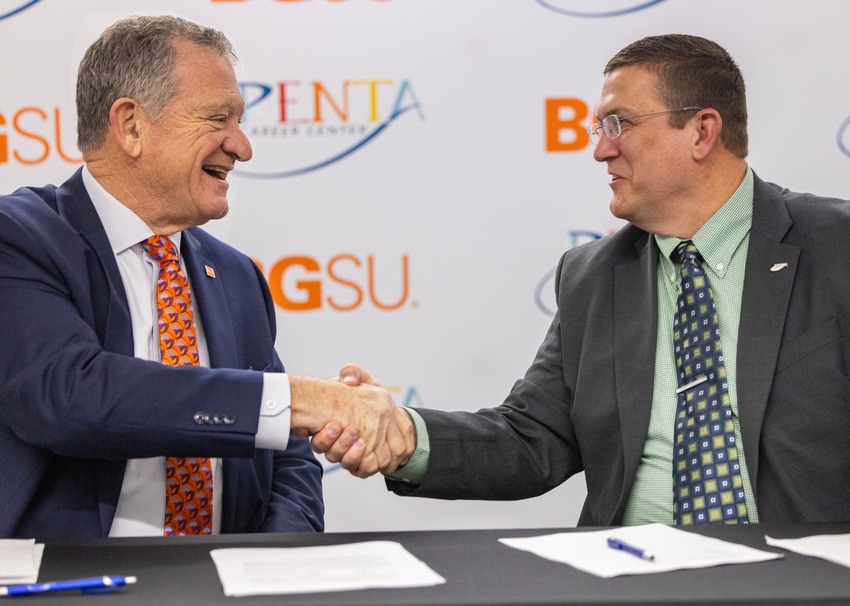
Estimated Reading Time:
Following the election, the Research Network continues public outreach with podcasts, research, publications and future polls
By Branden Ferguson
The Democracy and Public Policy Research Network in the Department of Political Science at Bowling Green State University focused on nonpartisan data collection and civic engagement earlier this year, conducting web-based polls in the months leading up to the presidential election.
With the election now over, the Research Network — a community of scholars and BGSU students working to promote citizenship, innovation and the public good — launched a podcast to continue its work in supporting a healthy democracy through education.
"There was a real hunger that students articulated for young people to have a space to bring awareness to issues in the world and explore those in a place where students can ask questions and learn something," said Dr. Robert Alexander, founding director of the Democracy and Public Policy Research Network. "To meet that need, students have taken to the airways and started the 'Democracy Exchange: With the DePo' podcast."

Developed, hosted, produced and managed entirely by BGSU students, the "Democracy Exchange" podcast has published four podcasts. Topics of discussion have included the 2024 election, in vitro fertilization and reproductive rights and, most recently, women in politics. The podcasts feature discussions with guests, including BGSU political science experts as well as Randy Gardner '81, '87, who previously served as a member of the Ohio Senate and Ohio House of Representatives.
"It has been an amazing opportunity to help start an organization from the ground up and to be given the chance to get the perspectives of people who are experts in their field," said senior political science student Samantha Conrad. "As the podcast host, I work with a team to develop discussion topics, find guests, record the podcasts and post them to social media."

The "Democracy Exchange" podcast is available on many platforms including Spotify and YouTube. Podcasts can also be found on the Democracy and Public Policy Research Network's social media pages. The podcast has provided students like Conrad with the opportunity to develop relevant skills on operating an organization, managing media platforms and creating public-facing content.
"I've learned that it takes a lot to start an organization," said Conrad. "I've filed paperwork, scheduled meetings, completed website training and connected with some amazing people. This experience has given me a glimpse into what public administration and nonprofit work may be like. We are doing something that will have a permanent, lasting and positive impact in the community and here at BGSU."
Alexander is impressed with the eagerness of his students and the rate at which they have progressed.
"I knew the podcast was going to live on Spotify, but I did not imagine the visual aspect of the show through the use of YouTube," said Alexander. "This has the potential to reach people of all ages and inform the public about politics and public policies. The topics that could be unpacked for informational and educational purposes are endless."
Future podcast topics are still being discussed, but Conrad said she is passionate about pursuing a politics and pop culture episode.

"Social media has changed the game of politics and is where many people receive political information," said Conrad. "I want to dive in and talk to people about how social media impacted how they look and think about politics.
"With partisan opinions found all over social media and online, our podcast has the opportunity to provide a nonpartisan alternative on Spotify, YouTube, Facebook, Instagram and more."
Beyond the "Democracy Exchange" podcast, Alexander and other faculty members help students build their resumes and portfolios through additional experiential learning opportunities.
"Following the two polls we put out earlier this fall, we now have all this data to look at and conduct future research on," said Alexander. "There are opportunities to work with students on research papers, political journal publications, academic publications and maybe some op-ed columns. We can inform the public and work toward a better understanding of the public good."
While still ironing out the details, the Research Network also plans to provide students a space for partisan discussions moderated by a facilitator.
"We hear a lot about cancel culture, but as members of the Democracy and Public Policy Research Network, we want to work toward a counsel culture," said Conrad. "Disagreements can lead to healthy and beneficial discussions. We plan to create a space for students to disagree and have partisan views, but still be able to come together and have conversations and engage civilly with each other."
As for additional polling, Alexander said there are plans for future polls to be distributed to Ohio voters, with students playing a larger role in developing questions and analyzing the data. The release dates and topics have not been determined, but Alexander said students have expressed interest in developing polls on the Electoral College, the inauguration and the first 100 days of the presidency.
-
 BGSU and Penta Career Center formalize partnership, dual enrollment program
The partnership puts students on an accelerated path to earning a bachelor's degree at BGSU.
BGSU and Penta Career Center formalize partnership, dual enrollment program
The partnership puts students on an accelerated path to earning a bachelor's degree at BGSU.
-
 BGSU students take to the airways with a podcast, as part of Democracy and Public Policy Research Network
The "Democracy Exchange: With the DePo" podcast is developed, hosted and produced by BGSU students, and features political experts and former state representatives
BGSU students take to the airways with a podcast, as part of Democracy and Public Policy Research Network
The "Democracy Exchange: With the DePo" podcast is developed, hosted and produced by BGSU students, and features political experts and former state representatives






